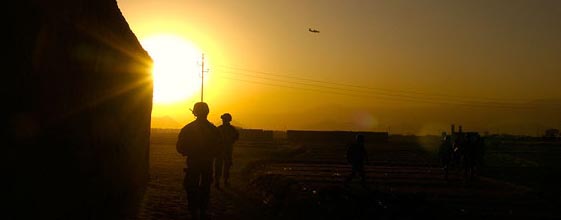
Police officers who are deployed to the war zones are just like everyone else. Many experience issues related to separation from family members and loved ones. Some suffer reactions to stress on the battlefield or stress from simply living in the war zone. Others find it difficult to make the transition back to work, family and personal life.
The difference between the average citizen and the police officer lies in the fact that upon return to the civilian world, the officer continues to carry a weapon everyday, they continue to confront hostile forces each day they are on the job and they continue to run the risk of exposure to highly toxic critical incidents.
Through a volunteer cadre of SC Law Enforcement Officers who are also combat veterans, we now have a Post Deployment Peer Support Team. The mission of this team is to support fellow South Carolina cops as they make the transition from the war zone to the local law enforcement agency.
Programs and services in cooperation with the South Carolina Army National Guard include:
Post-Deployment Debriefing
Based on the work of the International Critical Incident Stress Foundation, the Post-Deployment Debriefing provides a peer-based group process led by other cops who are also combat veterans. In a 2-3 hour discussion, officers share their experience from the war zone, learn from each other and normalize their reactions. A law enforcement mental health professional provides essential teaching to assist in the transition process. These debriefings are held at least quarterly and sometimes more often. A debriefing may be initiated simply by calling the SCLEAP Offices. (See contact information on brochure.)
One-on-One Peer Support
Using the skills of active/reflective listening and basic crisis intervention techniques, one-on-one support of one law enforcement officer by another officer is often our first line of defense in helping cops get back on the road. In these one-on-one encounters, a police officer can confidentially reach out for resources and support. The peer team member can provide any number of resources, including but not limited to: liaison, advocacy, cathartic ventilation, social support, information, stress management suggestions, problem-solving techniques, cognitive reframing, spiritual support and referral for further assistance.
Post-Deployment Seminar (PDS)
The PDS is a model which has been in use by the Federal Bureau of Investigation since the early 1980’s. Using an alliance of Peers, Mental Health Professionals and Chaplains, the PDS provides a 3-day seminar format where officers find healing and a sense of resiliency as they work on war zone reactions and transitional issues in the presence of other cops who have traveled the same path. Officers are encouraged to bring their spouse (or significant other) to the seminar.
Referral for Further Services
Neither the Post-Deployment Debriefing, nor one-on-one peer support nor Post-Deployment Seminars could be described as traditional psychotherapy. Nor are they a substitute for psychotherapy. Consistent with the best practices in the mental health field, the Post-Deployment Peer Support Team can help officers get in touch with mental health resources in their area of the state. Issues such as clinical depression, marriage and family conflict, PTSD, alcoholism and a host of other maladies related to deployment can often show improvement if worked on with a licensed mental health practitioner.
Download PDF brochure for more details and contact information.
COMPASS Seminar 21 February 28-March1, 2020
fact sheet , information page
Download research project paper on "The Impact of Behavioral Health Issues on Soldiers Returning from Deployment" provided on this website by permission of Colonel R. Van McCarty, SCARNG
 Read report on Combat Deployment and the Returning Police Officer from the U.S. Department of Justice publication COPS Innovations. This report examines issues concerning police officers’ transition back to work after combat zone deployment. Topics include the psychological effects of combat deployment, methods that may lessen the severity of combat stress experienced, and strategies used by police agencies to help officers returning back to work, their families, and communities. The report highlights the responses of four police agencies that have taken measures to assist returning officers, and offers recommendations for further study.
Read report on Combat Deployment and the Returning Police Officer from the U.S. Department of Justice publication COPS Innovations. This report examines issues concerning police officers’ transition back to work after combat zone deployment. Topics include the psychological effects of combat deployment, methods that may lessen the severity of combat stress experienced, and strategies used by police agencies to help officers returning back to work, their families, and communities. The report highlights the responses of four police agencies that have taken measures to assist returning officers, and offers recommendations for further study.
Published: 06/29/2012
Copyright 2017 South Carolina Law Enforcement Employee Assistance Program
Site designed and managed by Janet Katz and Joseph Katz, Paladin Services LLC, www.busman.com
